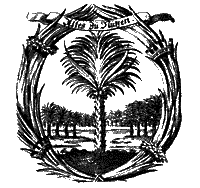
Fruitbearing Society
The Fruitbearing Society (German Die Fruchtbringende Gesellschaft, lat. societas fructifera) was a German literary society founded in 1617 in Weimar by German scholars and nobility.[1] Its aim was to standardize vernacular German and promote it as both a scholarly and literary language, after the pattern of the Accademia della Crusca in Florence and similar groups already thriving in Italy, followed in later years also in France (1635) and Britain.
It was also known as the Palmenorden ("Palm Order") because its emblem was the then-exotic fruitbearing coconut palm. Caspar von Teutleben (1576–1629), Hofmarschall at the court in Weimar, was the founding father of the society. As a young man he had travelled Italy and got inspired by the Italian language academies.[2] During the funeral celebrations of Duchess Dorothea Maria in August 1617 which were attended by several princes he took the opportunity to propose the founding of a society following the example of the Italian Accademia della Crusca.[2] Particularly Prince Ludwig von Anhalt-Köthen who already had joined the Accademia della Crusca in 1600 took hold of the idea and became the first president of the Palm Order.[3]
The society counted a king (Charles X Gustav of Sweden), 153 Germanic princes, and over 60 barons, nobles, and distinguished scholars among its members. It disbanded in 1668.
The first book about the Palm Order, Der Teutsche Palmbaum, was written by Carl Gustav von Hille and published in Nuremberg in 1647.[4]